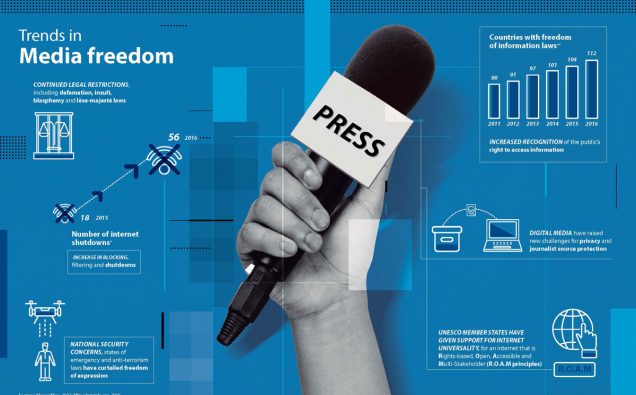
Photo Credit: UNESCO
The onslaught of information – that may be wrong and in many cases misleading – in the digital age is posing stiff new challenges for genuine journalism.
A new report Monday warned that “across the world, journalism is under fire,” amid the rise of ‘fake news’ stories that shroud the truth and muddy information, as well as social media algorithms that are contributing to the creation of virtual ‘echo chambers.’
The fast-paced spread of fake news and reproduction across platforms is exacerbating political polarization.
Consequently, several governments have shut down the internet, notably before elections. Journalists are under wide-ranging attack, facing rising violence.
The United Nations cultural agency noted in a new report that the media industry, which remains the primary source of news and information in the digital age, faces both vast opportunities and steep challenges.
In its flagship analysis of new trends in media freedom, pluralism, independence and the safety of journalists, UN Educational, Scientific and Cultural Organization (UNESCO) offers much food for thought.
“Covering the period 2012 to 2017, this study not only maps emerging global trends – it makes an unequivocal call to action to counter new and persistent challenges,” Irina Bokova, Director-General of UNESCO says.
Titled the World Trends in Freedom of Expression and Media Development, the report documents a series of new developments.
“This provides a unique reference point for Member States, intergovernmental organizations, civil society groups, academia, journalists and media professionals, and all those who wish to understand the fundamentals of press freedom in a changing world,”Bokova said.
![By Brian Solis and JESS3 (theconversationprism.com) [CC BY 2.5 (http://creativecommons.org/licenses/by/2.5)], via Wikimedia Commons](https://www.viewsnews.net/wp-content/uploads/2016/05/Dialgram-on-social-media-Conversationprism-959x1024.jpeg)
By Brian Solis and JESS3 (theconversationprism.com) [CC BY 2.5 (http://creativecommons.org/licenses/by/2.5)], via Wikimedia Commons
Women journalists are able to develop an online presence liberated from newsroom hierarchies, and citizen journalists and activists have access to modes of mass communication that were previously unthinkable, the report says.
But there are stark warnings emanating from harmful trends.
“The stakes are even higher for citizens across the world, women and men, who rely on professional journalism to navigate the development and transformation of their societies,” Ms. Bokova says.















